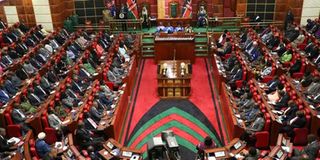It is a death wish to politicise essential services

A joint National Assembly and Senate sitting on March 27, 2014. FILE PHOTO | BILLY MUTAI |
What you need to know:
- MPs and senators are currently engaged in a supremacy battle over basic human rights.
- We have re-invented the wheel, putting the lives of our people at the mercy of parochial interests in the name of devolution.
It has been argued that a society can be judged by how it treats its most vulnerable members such as children, the sick and disabled, the elderly and the weak.
Perhaps this is why most governments, as they plan their service delivery, classify certain sectors as essential, and develop policies under the direct control of the national government to take care of the needs of these sectors.
This is why no matter what else is farmed out to other actors, national governments often guarantee (at least basic) education, healthcare, social security, and national security.
Often, aspects of infrastructure covering the whole country are also planned and implemented by the national government, since they also affect the essential services one way or the other. This is the case in any jurisdiction where those that wield power are able to think into the future beyond the few days they will be in power.
PAROCHIAL INTERESTS
Unfortunately, this is not the case in our beloved republic. Neither the politicians nor their voters care one jot about the future generations, and most decisions are made only with the current and imminent fullness of the stomach in mind.
The hungry politician steals money meant for essential services to build his own palatial mansion next to the slum in his constituency. The hungry voter gratefully accepts morsels that drop from the politician’s table and rewards him with ‘landslide’ victories at every election.
We have re-invented the wheel, putting the lives of our people at the mercy of parochial interests in the name of devolution. We purport to have completely devolved healthcare, and turn a blind eye to Kenyans dying in many parts of the country due to mismanagement of the sector, simply because “they are in the minority, and majority of Kenyans are enjoying improved health services thanks to devolution”.
There are even cries that we should devolve national security and education “because the national government is either inept or unwilling to provide these services to certain areas in this country”.
We have lost the point completely.
VICIOUS DISAGREEMENT
Elsewhere, when the national government fails to provide essential services due to either incompetence or unwillingness, the voters have their say and a democratic regime change occurs.
In our parts, we have overcome cognitive dissonance and completely separated our choices at the ballot from service delivery considerations. Our routine involves voting for our tribesmates and clansmates and then spending five years lamenting about poor services and ‘marginalisation’, without making any connection between the one and the other.
In the past few weeks the Houses of Parliament have had a vicious disagreement about how much money should be disbursed to the counties.
One House has suggested that additional resources be sent to the counties to fund the large hospitals that serve multiple counties, while the other is adamant that this should not be the case. It is as if members of one House come from the counties while those in the other House come from Mars.
And yet all of them are Kenyans born and bred somewhere in this republic where citizens are dying due to inadequate health services.
There cannot be a more powerful argument for centralisation of the essential health services than this, in my view. Politicians can argue all they want, but nobody should suffer and die unnecessarily due to these recurrent pissing contests.
Prof Lukoye is associate professor of psychiatry and dean, Moi University’s school of medicine; [email protected]





